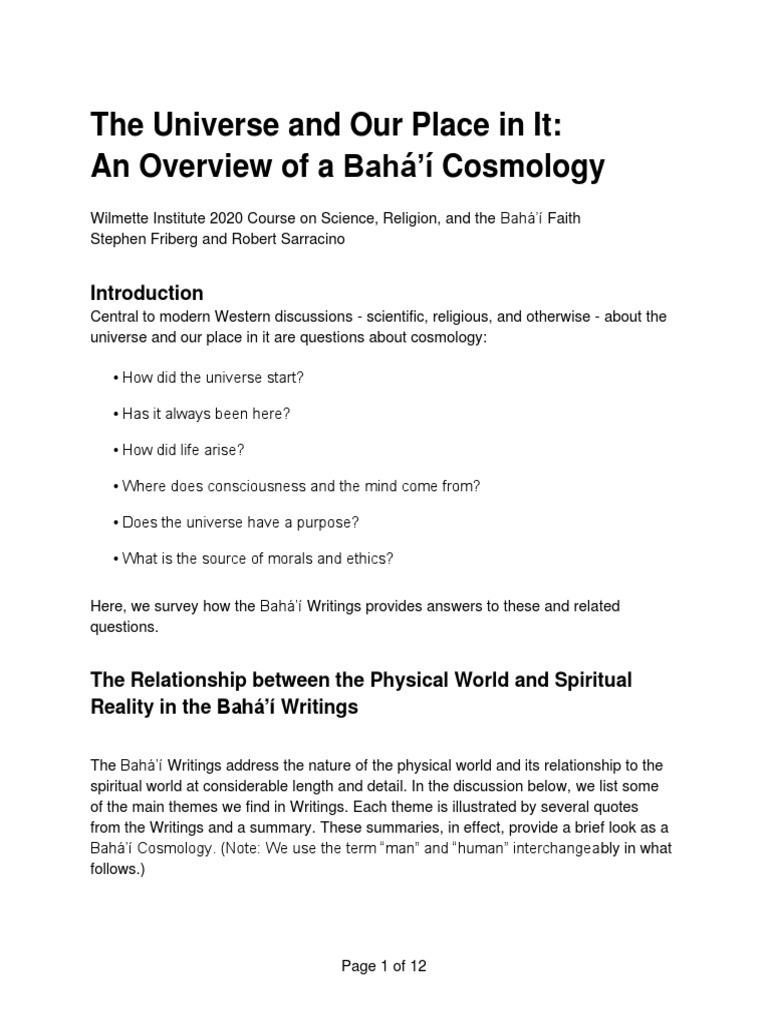The Bahá’í teachings present a profound exploration of the interplay between materialism and the evolution of religion, underscoring the potential peril that excessive materialism poses to spiritual growth and societal cohesion. In a contemporary landscape dominated by the aggrandizement of material possessions, the Bahá’í perspective offers a clarion call to elevate the spirit beyond the tangible, urging adherents to embrace a holistic worldview that harmonizes the physical and the spiritual realms.
At the heart of Bahá’í teachings lies the assertion that materialism, characterized by an overemphasis on the acquisition of wealth and status, can lead to the spiritual decline of individuals and societies. This decline plays out like a submerged glacier; the visible tips of desire and greed may be alluring but conceal a vast, perilous undercurrent of discontent and societal fragmentation. Just as a glacier melts, threatening the integrity of the land it rests upon, unchecked materialism can erode the foundational principles of faith and love, which are pivotal for societal harmony.
Bahá’u’lláh, the founder of the Bahá’í Faith, elucidates that humanity faces a critical turning point; one can either ascend toward enlightenment or succumb to the quagmire of materialism that breeds inequality and injustice. The allure of material wealth can intoxicate the soul, ensnaring it in a web of transient pleasures while forsaking deeper, enduring satisfactions found within spiritual pursuits. A fabric interwoven with the threads of love, unity, and understanding is the antidote to this pervasive malaise.
This introspective examination leads to a metaphorical exploration: perceive religion as a garden nurtured by the gentle hands of its followers. When inundated with the drought of materialism, this garden risks withering; the vibrant flowers of faith quail in the unyielding heat of greed. Bahá’í teachings propose that the regenerative waters of spiritual devotion and communal solidarity are essential for the flourishing of this garden. The vibrancy of faith is dependent on nurturing its roots rather than obsessively collecting the fleeting petals of material gain.
Materialism can lead to the erosion of spiritual values, transforming the meaning of life into a mere pursuit of pleasure. This reductionist view can catalyze a collective existential crisis, as individuals grapple with their sense of purpose. The Bahá’í Faith advocates for the cultivation of inner virtues such as generosity, humility, and detachment from material possessions, positioning these qualities as the cornerstones for authentic fulfillment. In this light, material prosperity is not inherently negative; rather, it is the attitude towards wealth that determines its spiritual impact. Recognizing material wealth as a means to an end—facilitating service to humanity—rather than an end in itself serves as a pivotal shift in perspective.
The story of ‘Abdu’l-Bahá serves as an illustrious illustration of this principle in practice. Demonstrating the Bahá’í teachings through his own life, he lived simply and with purpose, often emphasizing that sustained devotion to the welfare of humanity outweighs the allure of temporal riches. His life exemplifies the potential harmony that exists when one ascends from the allure of materialism toward a more profound spiritual connection. In his interactions, he embodied an unwavering commitment to service, affirming that true prosperity lies in the betterment of the collective, rather than individual fetishes of wealth.
Moreover, the Bahá’í perspective posits that disconnection from spiritual roots engenders societal discord. A community anchored solely in material pursuit is akin to a ship adrift on turbulent waters, lacking the compass of moral significance to navigate the storms of existence. The teachings warn of the decline of religion when driven by material concerns, leading to dogmatism and sectarianism that stifle the universal principles of love and unity inherent in all faiths. Herein lies the most consequential aspect of Bahá’í spirituality: that genuine religious expression must encompass the spiritual transformation of the individual, leading to a collective upliftment that transcends the superficial layer of material existence.
In invoking the Bahá’í teachings, one is called to a transformative journey—a metamorphosis from the cocoon of self-interest into a butterfly of altruism that seeks to embrace others. This journey is not without its challenges; the seductive nature of materialism can be formidable, drawing individuals into its grasp with promises of satisfaction and identity. However, the Bahá’í teachings consistently illuminate the path towards a higher purpose—aligning one’s actions with the holistic principles of justice, compassion, and unity.
Consequently, the Bahá’í challenge to materialism invites a reconsideration of what it means to live a meaningful existence. It beckons individuals to engage in a deeper evaluation of their values, urging a shift from owning to being—embracing the profound simplicity of engaging with life on a spiritual level. The act of steadfastly nurturing one’s spiritual self amidst the relentless tide of material aspirations becomes a revolutionary act, capable of revitalizing both the individual and the broader community.
In conclusion, as one traverses the intricate lattice of Bahá’í teachings, the urgent dialogue surrounding materialism invites collective introspection and action. By fostering a culture that values the unseen forces of love, compassion, and unity over the superficial enticements of material wealth, humanity can aspire toward an enlightened existence—one where spirituality not only endures but thrives, nourished by the fertile grounds of faith and service.
